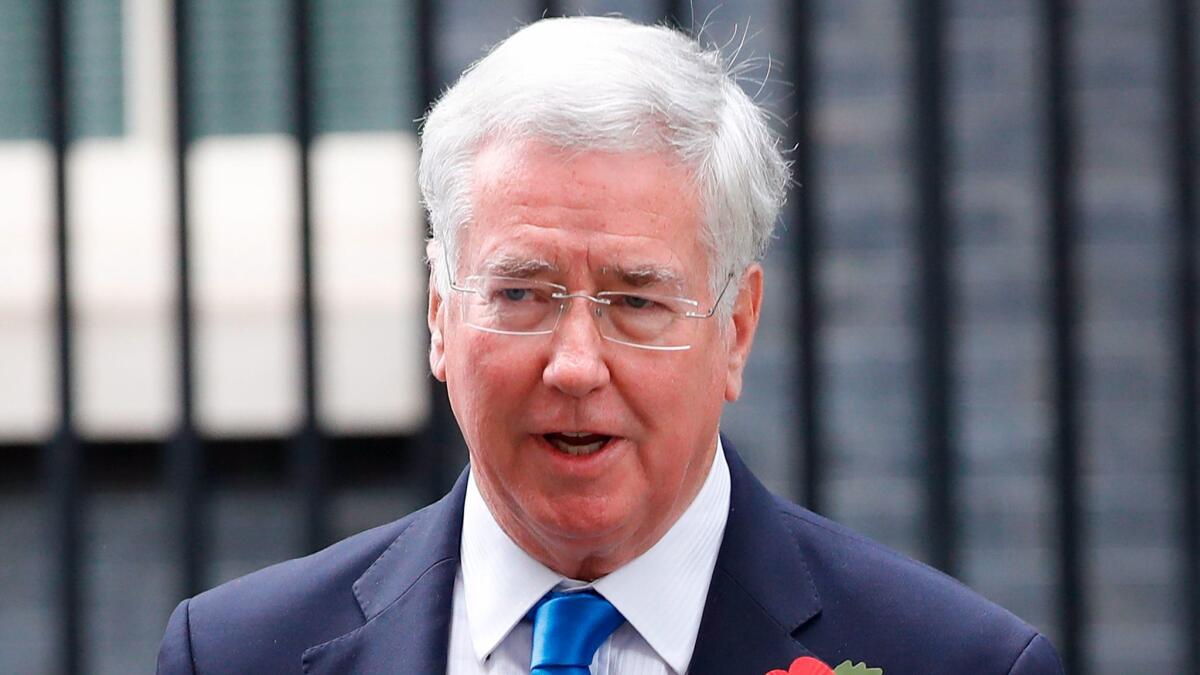Britain’s prime minister seeks to curb sexual misconduct in the nation’s politics

- Share via
Reporting from London — British Prime Minister Theresa May vowed Monday to stamp out the troubling abuse of power within the corridors of Westminster as a growing sexual harassment scandal engulfed some of the country’s top politicians.
Two senior members of May’s Conservative Party have stepped down and with several more lawmakers from across the political spectrum suspended, under investigation or facing allegations of impropriety, she said it was time for all party leaders to tackle the issue of sexual misconduct.
May declared that a “new culture of respect” was needed and vehemently condemned those lawmakers who have used their position of influence to “abuse their power” and thereby create an environment where their victims felt unable to speak out.
“Women and men should be able to work free from the threat or fear of harassment, bullying or intimidation,” she said in a speech at the Confederation of British Industry’s annual conference.
The scandal cuts to the heart of British politics and involves a slew of allegations ranging from inappropriate advances and touching, to the sending of suggestive text messages and even rape.
It comes after a multitude of abuse allegations against movie producer Harvey Weinstein and others that have created a ripple effect across the Atlantic and has been described as a “watershed moment” for British politics by Home Secretary Amber Rudd.
“This isn’t just unique to Westminster, this is about fundamental change to the way that power in authority is exercised,” Rudd said.
“What is good about this is it’s going to lead to fundamental change,” she said. “What is bad is the abuse of power. It needs to end and I hope the Westminster workplace can make the changes so many other workplaces have made so that men and women can work together with respect.”
Political leaders met for a crisis meeting of sorts, where they sought to devise a plan to ensure that anyone who feels victimized has a clear means of recourse to report the issue, and have it taken seriously.
They agreed to the establishment of an independent grievance procedure that would be enforced across Parliament. It should be established by next year, the prime minister said, and a new face-to-face human resources support service and improved phone line for complaints are expected to be introduced by the end of the month.
May’s defense minister, Michael Fallon, resigned last week amid allegations that he made unwanted advances to two female journalists dating to the early 2000s as well as lewd comments to Commons leader Andrea Leadsom, who ran against May for the prime minister position after David Cameron resigned as a result of the pro-Brexit referendum outcome last year.
“The culture has changed over the years,” Fallon told the BBC last week after admitting his behavior had been inappropriate.
“What might have been acceptable 15,10 years ago is clearly not acceptable now. Parliament now has to look at itself,” he said.
Another member of May’s inner circle, her most senior minister, Damian Green, is the subject of a Cabinet Office inquiry after being accused of touching the knee of party activist Kate Maltby in 2015 and later sending her suggestive texts after she was pictured wearing a corset in a newspaper. He denies the allegations.
Conservative member of Parliament Chris Pincher resigned Sunday from his post as government whip, a job that involves enforcing party discipline, and referred himself to the police and the party’s complaints procedure after the Mail reported allegations that he made sexual advances toward a party activist and former Olympic rower Alex Story in 2001 at Pincher’s London home.
Allegations of harassment and misconduct have also been made against members of the Labor and Liberal Democrat parties and governments in Wales and Scotland.
Jeremy Corbyn’s Labor Party suspended member of Parliament Kelvin Hopkins last week over claims of inappropriate advances toward a Labor Party activist in 2004, which Hopkins denies.
The party has launched an independent investigation into allegations by Bex Bailey, a Labor activist, who has said she was sexually assaulted and discouraged from reporting the alleged attack that occurred at a party event in 2011.
Corbyn, who during a weekend conference described the Westminster culture as “warped and degrading,” said Monday that the behavior was not confined to politics or the film industry.
“Such abuse, sexism and misogyny is, sadly, very far from being confined to Hollywood and the corridors of power, but is also widespread in our schools and universities, in our businesses and workplaces, in our newspapers and on our TV screens. It is all around us,” he said at the Confederation of British Industry’s conference.
“That must change and business has an essential role to play. All of you need to look hard at yourselves, as we in the Labor Party are doing ourselves, to see how your processes and procedures can be improved. How it can be made easier for women to speak out and for victims to get the support they have a right to expect.”
Boyle is a special correspondent.
More to Read
Sign up for Essential California
The most important California stories and recommendations in your inbox every morning.
You may occasionally receive promotional content from the Los Angeles Times.













